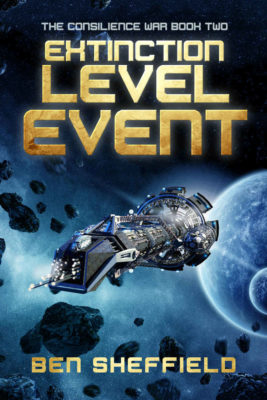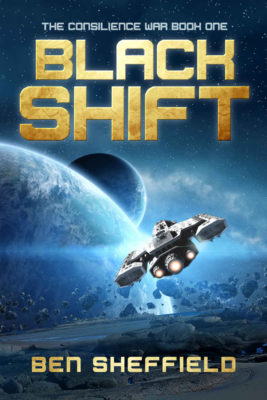It is the year 2142. The planet Caitanya-9 has vanished from the heavens, along with its promises of doom. Only Sarkoth Amnon knows the full truth. The planet was a superweapon, created by a race of godlike aliens for the very purpose of their own extinction. Its power is now in the hands of a psychopathic madman called Wake, a man who has every reason to hate Amnon and the empire he now controls. Moments before the apocalypse, he disappeared with the planet to regions unknown. He left behind a single promise: he will be back.
Amnon has returned to Terrus, and faces new problems. A doomsday cult that wishes to possess Caitanya-9 for their own ends, and which Amnon has just betrayed. A childhood friend, snatched from the planet, who might be the key to Amnon’s salvation or his ruin. In a world full of uncertainties and falsehoods, of treachery and lies, Sarkoth Amnon knows that only one thing is certain.
Caitanya-9 will return, and the skies will burn from horizon to horizon.
$3.10 on Amazon
No Comments »
“I’ve been thrown out here on this planet. No memories. A gun in my hand, an enemy in front of me, but no memories. And now I see the truth: I was put here to fail. I don’t get to be a martyr, or a hero. I get to be destroyed. You want anger? I can help. Anger is what I do.”
Caitanya-9. Unmappable and unchartable. Orbited by two supermassive black moons, its landscape is in constant flux from earthquakes and volcanoes. The only inhabitants are a mysterious race of aliens, and when a team of geologists makes a terrifying discovery beneath the planet’s surface, the aliens turn hostile.
Five years away Terrus receives a distress call and dispatches a team of six marines to control the situation.
Interstellar travel erases the subjects’ memories. When the marines wake up from a five-year sleep, they have no recollection of who or where they are.
The rank and file receive memory implants, informing them of their pasts.
Their leader receives nothing.
Either by mistake or intent, his identity is a mystery. Battle looms on Caitanya-9, and while the marines prepare to fight a deadly enemy on an ever-changing world, their leader must face the enemy before him, the enemy behind him, and the enemy inside his own head.
$0.73 on Amazon
No Comments »
[26 short stories of surrealistic horror]
To begin, find a source of static. Static is everywhere. To look is to find.
The sanity wallpapering the world is thin and grows thinner every day. Everywhere there are little holes where order has broken down. So put an eye or ear to a hole and witness the storm gathering beyond. Turn the static up as loud as you can endure and listen.
The hive is listening back. The thing. The space in the middle. The forgotten. The overlooked. The nameless, constantly grasping towards a name and a shape. And above all, a home.
You might find you like static. You might find you like chaos. This means the hive is building its home in you.
$0.95 on Amazon
No Comments »



